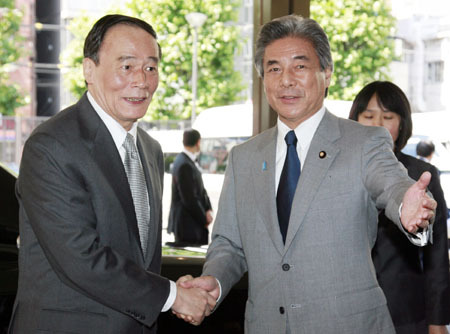The second China-Japan high-level economic dialogue closed?in Tokyo on?Sunday, sending a clear message that the two sides will make continued efforts to forge strategic and mutually beneficial relations in trade and economy.
 |
|
Chinese Vice Premier Wang Qishan (L) shakes hands with Japanese Foreign Minister Hirofumi Nakasone prior to the meeting in Tokyo, capital of Japan, June 7, 2009. The second China-Japan high-level economic dialogue, co-chaired by Wang Qishan and Hirofumi Nakasone, opened here Sunday. [Ren Zhenglai/Xinhua] |
The one-day dialogue, co-chaired by Chinese Vice Premier Wang Qishan and Japanese Foreign Minister Hirofumi Nakasone, focused on a wide range of topics including energy conservation, environmental protection, finance, trade and investment and intellectual property as well as regional and international economic issues.
Profound changes have taken place in the international economic and financial sectors since the first China-Japan high-level economic dialogue in December 2007. Coping with the ongoing global financial crisis has become the major concern for both countries.
Faced with the grave challenges posed by the crisis, the two countries agreed that they should implement the consensus reached at G20 Washington and London summits and adopt more effective measures to ensure stability in financial markets and promote their own economic growth and contribute to the early recovery of the world economy.
As each other's major trade partner, the two nations have become increasingly interdependent in economy and trade. Notably, the current dialogue highlighted potential cooperation in energy conservation and environmental protection.
As the world's second largest economy, Japan is also a leader in energy conservation and environmental protection technologies, whereas China is the world's largest developing country with huge market demands. The two countries are highly complementary economically.
Both sides have agreed to expand cooperation in environmental protection. Meanwhile, they expressed readiness to further remove barriers of various kinds, and enhance cooperation in such areas as technology trade, small and medium-sized businesses, quality control and food safety.
During the current economic dialogue, the two sides signed eight important documents, including the MOU for International Property Protection Exchanges and Cooperation, Meeting Minutes on Agriculture Cooperation between China and Japan, and the MOU on Strengthening Science and Technology Cooperation in the Field of Seismology.
As Japan and China are the two largest economies in East Asia, the advancement of their cooperation is of great importance in maintaining the region's economic stability, tackling the global financial crisis and boosting cooperation between developing and developed countries.
During the talks, both sides also reached consensus on tackling regional and global economic issues, and reiterated their will to take responsible approach and strive to enhance regional and international economic and financial cooperation.
Such consensus and endeavors will undoubtedly play a constructive role in the development of both regional and global economies.
The success of the second China-Japan high-level economic dialogue once again proved that such a mechanism is playing an important role in advancing bilateral ties.
Under this mechanism, the two sides discussed strategies on economic growth and macroeconomic policies, coordinated cross-sector economic cooperation, and enhanced policy exchanges on major regional and international economic issues.
The mechanism is expected to elevate bilateral cooperation in economy and trade to a new high and have even greater positive impact on the economic stability and prosperity of Asia and the world at large.
(Xinhua News Agency June 8, 2009)